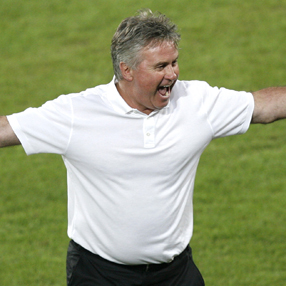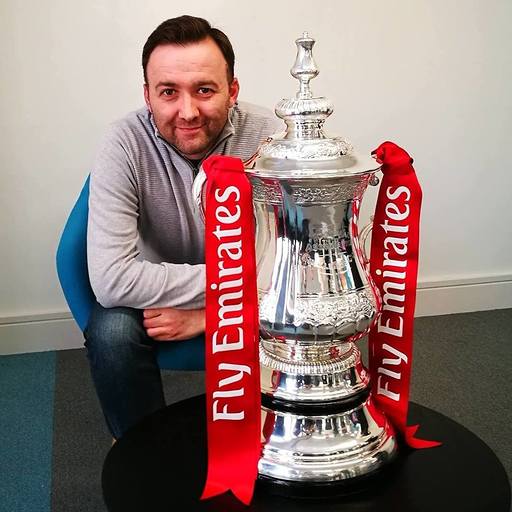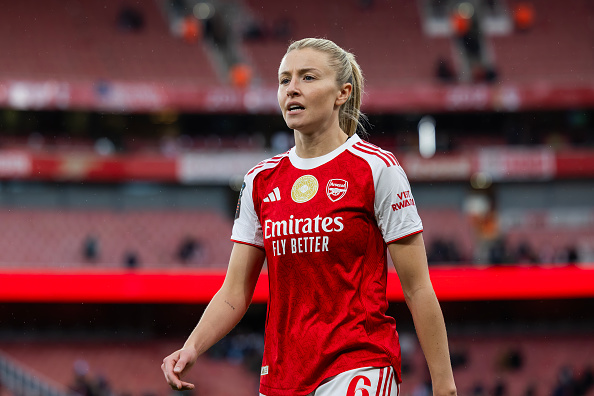Guus Hiddink: Q & A
"Whatever formation you end up playing, it is always a question of what you do as a team and how individuals interact..."

The best features, fun and footballing quizzes, straight to your inbox every week.
You are now subscribed
Your newsletter sign-up was successful
Want to add more newsletters?

Five times a week
FourFourTwo Daily
Fantastic football content straight to your inbox! From the latest transfer news, quizzes, videos, features and interviews with the biggest names in the game, plus lots more.

Once a week
...And it’s LIVE!
Sign up to our FREE live football newsletter, tracking all of the biggest games available to watch on the device of your choice. Never miss a kick-off!
Join the club
Get full access to premium articles, exclusive features and a growing list of member rewards.
Is there any formation you feel is more efficient than the rest?
4-4-2, 3-5-2, 4-3-3… whatever formation you end up playing, for me it is always a question of what you do as a team and, as a consequence, how individuals interact: what position you take when you have the ball, your first intention when you’re in possession. These are the key elements for a football team, not formation as such.
So, do you fit players to formations, or formations to the players?
For sure, the formation I use depends on the players I have. If I play with one striker it doesn’t mean I prefer one striker. If I have three good strikers I’ll try to use them all.
How and when do you decide to play three or four at the back?
It depends on the opponent – and then on the defenders and their habits. If, for example, as youngsters they were used to playing three at the back, it can be hard for them to fit into four at the back.
For some players it really is a big problem to change from one formation to another. You have to be very careful if you want to change things radically, especially with the national team – when you don’t really have enough time to practise a lot or teach them how to play differently from what they’ve been used to playing at their clubs.
At PSV in 2005, you gambled against Milan in the Champions League semi-final second leg. Gordon Strachan said that display was as tactically brave as he’d seen. You almost played without a left-back at times. What are your memories of that game?
It was a fantastic game. I changed the formation a little bit when we played them again in the group stage of the following campaign a couple of months later. I put the youngsters in. One of them – Ismael Aissati – was only 17 years old, and he did very well.
You shouldn’t be afraid to bring in youngsters. If a player is well prepared technically and physically, don’t be afraid to field him just because of his age. You must show players you are confident in them.
Which players that you’ve worked with have impressed you most in terms of pure talent?
There are several. Predrag Mijatovic was very talented, and Dennis Bergkamp. But the most interesting player I’ve worked with is Romário. He was the kind of guy who scored goals easily and always promised to score.
Before crucial matches, when you’re a little bit nervous, he’d come to me and say: “Coach, tranqilo [relax]. Romário will score, and we will win.” And he would. Not every time, but in eight out of ten games like that he’d score the winner.
And in their application and hard work?
All the Koreans – but even more so Jaap Stam was very committed, and Philip Cocu was quite perfect. I think he’ll become an outstanding coach. A third one is Alex during my PSV times.
What disappoints you most in a player?
When a player isn’t real in the game. For example if he makes a lot of fast movement but doesn’t receive a pass – and starts blaming the other players for mistakes they’ve made. I have some names in my head. These players think they are much better than they really are. That’s what disappoints me.
Which coaches did you look up to?
Ernst Happel. I met him a few times. He was very demanding of his players and yet very friendly with them at the same time. He was a very good person. Players liked to work with him, and practically all the teams he coached enjoyed success.
No Dutch side has made an impact in Europe since PSV in 2005. Why do you think that is?
We have less quality at the moment. At Ajax and Feyenoord, no big players have been brought through in recent years. There are some gifted players, but not enough to have success in the Champions League. If we work hard on an educational level, the good times will come back.
You have coached at three World Cups. What are your best memories?
I had a terrific Netherlands team at France 98. They played football that was recognised around the world. I enjoyed working with them. Then, in 2002, I had a miraculous Korean team. Our year of very tough training paid off. Australia was a specific case. When I got there, they had no confidence whatsoever, they were totally down.
Australians are normally totally different, a fighting nation, but I found no confidence in the team. So I challenged them. Mark Viduka said to me: “Coach, why are you doing this? You could spoil your reputation.” I said that if he didn’t start working hard right then, he’d spoil his own reputation, not mine.
This interview first appeared in Champions, the official magazine of the UEFA Champions League.
The best features, fun and footballing quizzes, straight to your inbox every week.
Gregg Davies is the Chief Sub Editor of FourFourTwo magazine, joining the team in January 2008 and spending seven years working on the website. He supports non-league behemoths Hereford and commentates on Bulls matches for Radio Hereford FC. His passions include chocolate hobnobs and attempting to shoehorn Ronnie Radford into any office conversation.
 Join The Club
Join The Club











